-
Protecting Your Eyes from Fireworks
Fireworks are an iconic part of summer. Unfortunately, fireworks are as dangerous as they are beautiful. Every year, thousands of patients are seen in emergency rooms across the country because of injuries caused by fireworks. Often, these injuries involve the face. Because eye injuries, other catastrophic injuries, and death can occur from the misuse of fireworks, June has been declared National Fireworks Safety Month. This awareness month, which actually runs through the Fourth of July, was designed to help consumers prevent fireworks injuries. If you plan to ignite fireworks this summer and live in Chicago, follow some basic eye care tips. An ophthalmologist at your local ophthalmology practice can work wonders with modern medical technology, but eye injuries caused by fireworks can cause permanent damage and vision loss.

Reconsidering the Use of Fireworks at Home
The only safe way to enjoy fireworks is to view a show put together by professionals. Enjoy the fireworks display from behind the safety barriers at a distance of at least 500 feet.
Using Appropriate Safety Gear
If you do plan to use fireworks at home, check your local laws first to be sure they are legal in your area. Then, purchase safety glasses for everyone who will be handling the fireworks. Your ophthalmologist can recommend an approved type of safety glasses. Keep a bucket of water nearby and have access to a garden hose.
Igniting Fireworks as Safely as Possible
Never allow children to ignite, handle, or come near fireworks. This includes sparklers, which can burn at about 2,000 degrees Fahrenheit. This temperature is hot enough to melt certain metals. When an adult is ready to light the fuse, he or she should avoid placing any part of the body over the fireworks device. Instead, the adult should hold the lighter out at arm’s length away from the body to light the device. Immediately upon ignition, the adult should back away quickly. Alcohol should never be consumed before or during the handling of fireworks. Furthermore, adults should never attempt to re-light a “dud” firework. Instead, wait 20 minutes and then soak it in water.
-
Practicing Good Eye Health
Good eye health is essential for your quality of life. Unfortunately, many people take their vision for granted until they experience problems. One of the best ways to promote good eye health is to make an appointment with an eye doctor each year for an exam. When you visit the ophthalmology practice in Chicago, the ophthalmologist will do much more than update your vision correction prescription as needed.
As you’ll learn when you watch this video, your ophthalmologist will also check for the early signs of eye health problems such as macular degeneration, diabetic retinopathy, and glaucoma. These are the three leading causes of vision loss in the U.S. The eye doctor in this video explains how these problems develop. If you’re concerned about your risk of eye diseases, talk to your ophthalmologist about ways of managing your risk.
-
What Is Dry Eye?
Dry eye is extremely uncomfortable, and when left untreated, can lead to chronic pain, eye ulcers, and corneal scarring. See your eye doctor for dry eye treatment in Chicago to prevent long-term complications and chronic discomfort.
Dry eye occurs when the eye either doesn’t produce an adequate amount of tears or produces tears that evaporate too quickly. This causes inflammation that can make it difficult to look at a computer screen, watch television, or read. With dry eye, patients experience stinging, burning, the feeling of sand in the eyes, redness, inability to cry, and decreased tolerance for dry environments. There are many different causes, ranging from medications to certain eye diseases.
There are a number of different ways your doctor can treat dry eye. Sometimes, switching medications can be the solution. Other patients benefit from eye drops and nutritional supplements. In rare cases, eye surgery to prevent premature tear evaporation could be helpful. Your eye doctor will devise a dry eye treatment plan based on the root cause of your symptoms.
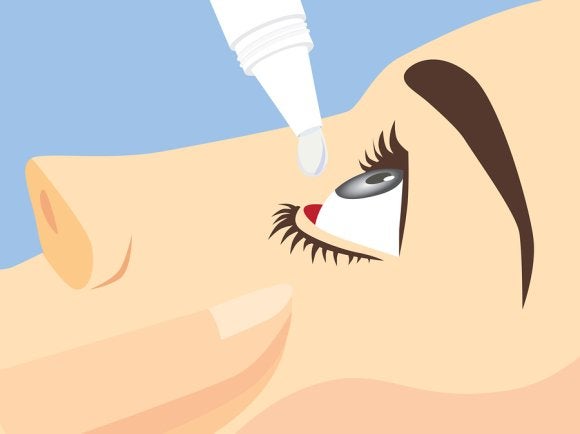
-
Recognizing Healthy Vision Month
Every May, the National Eye Institute celebrates Healthy Vision Month to remind people of all ages to stop and pay attention to their eye health. After all, while you may see your doctor for an annual physical, many people only see an eye doctor when they have an issue, which means you could be missing out on important preventative care. Take the time now to make an appointment with your eye doctor in Chicago, and focus on your eye health with these important tips.

Find Out Your Family History
Did you know that many eye diseases are hereditary? Understanding your family’s eye health history will help you and your eye doctor determine which diseases could happen to you. Because many conditions that cause blindness run in families, knowing your risks can help your eye doctor make important decisions about screening tests and treatments that are right for you.
Live an Eye-Healthy Lifestyle
Many of your everyday habits can impact your eye health. Smoking can cause a number of different eye problems, including cataracts and macular degeneration, so don’t pick it up, or ask your doctor for help quitting if you are currently a smoker. Eat a healthy diet with plenty of vitamin-rich foods. If you have a chronic condition that impacts your eyes, like diabetes, follow your treatment plan closely. Wear sunglasses to avoid eye damage from UV exposure, and wear protective eyewear when necessary on the job and in sports.
Get Regular Eye Exams
Many eye conditions don’t have symptoms in their early stages, which means you could miss an important window of treatment opportunity. Your eye doctor can diagnose and treat these conditions by identifying them during an annual eye exam. Be sure to have a dilated eye exam when recommended by your doctor. Dilated exams let your eye doctor see the back of your eye to better evaluate your eye health. Eye exams are also important for verifying the effectiveness of your current vision correction treatments, like eyeglasses, and make adjustments to your prescriptions as needed.
-
Eating for Eye Health
As your eye doctor can tell you, your diet can affect your vision in a number of ways, but if you have diabetes, the foods you eat take on even more significance. Talk to your eye doctor in Chicago about the link between blood sugar control and vision health. This video explains more.
High blood sugar can cause damage to the blood vessels in your eyes that can lead to blindness. By controlling the amount of carbohydrates in your diet, you can better control your blood sugar level and reduce the chances of eye damage. When you visit your eye doctor, he or she will perform an exam to check for diabetic eye damage and can offer eye care tips, including dietary advice, to better protect your vision.
-
Raising Awareness on Cataracts
Cataracts are a common health condition, but many people still do not understand the causes, symptoms, and their own risk factors. The good news about cataracts is that, with early treatment by your eye doctor, treatments including cataract surgery in Chicago can save your vision and prevent permanent eye damage. In honor of May’s Cataract Awareness Month, take a moment to learn about this common vision problem and ways you can save your sight if it happens to you.
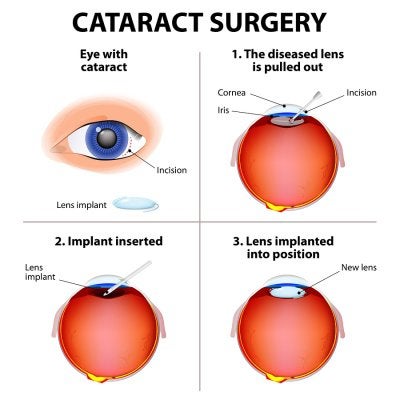
What Are Cataracts?
Cataracts cloud the lenses in your eyes, obscuring your vision. They can occur in one eye or both, but they are not contagious and cannot be transferred from one eye to the other. According to the National Eye Institute , over half of people over age 80 have at least one cataract or have had cataract surgery. Although they are commonly associated with aging, anyone can develop a cataract at any time.
What Are the Causes?
Cataracts are caused by proteins in your lenses that clump together to make your vision look cloudy. Age is the most significant risk factor, but smoking, excessive alcohol use, excessive sun exposure, and some chronic diseases, such as diabetes, can also increase the chances of developing cataracts.
What Are the Symptoms?
The first symptom many people with cataracts notice is cloudy vision. You may also notice that colors seem faded or that you’re experiencing double vision in the affected eye. Glare from headlights and lamps often seem more intense with cataracts, and night vision may worsen. Needing to adjust your eyeglasses or contact lenses prescription frequently could be the result of a growing cataract.
What Are the Treatments?
For some patients, eyeglasses work as an initial cataract treatment. If the cataract grows, surgery may be necessary. During cataract surgery, the damaged lens is removed and replaced with an artificial one. Even if your cataract does not interfere with your vision, you eye doctor may recommend that it be removed if it makes eye exams difficult or makes it more complicated to treat other eye conditions.
-
Protecting Your Eyes During Sports
If you play sports regularly, you should ask an ophthalmologist near Chicago for tips on preventative eye care and protective eyewear. Opticians recommend that you wear protective eyewear during sports in order to reduce your risk of serious eye injury or damage. Here is a look at how eye doctors recommend you protect your eyes while playing high-risk, moderate-risk, and low-risk sports.
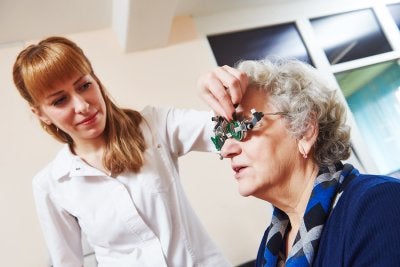
Eye Protection for High-Risk Sports
If you regularly play high-risk sports, your ophthalmologist will recommend that protective eyewear become a regular part of your eye care routine. Eye protection is particularly necessary if you wear contact lenses, as they put you at higher risk for eye injury and damage. High-risk sports include paintball, basketball, racquetball, softball, and football. These sports are high-risk because they involve swinging bats, fast moving balls, and heavy contact. You’re much more likely to need to visit an eye doctor for emergency eye care if you don’t wear protective eye wear while playing high-risk sports.
Eye Protection for Moderate-Risk Sports
Moderate-risk sports include golf, tennis, and soccer. While these sports still carry the risk of eye injury due to fast moving balls and swinging clubs and racquets, they are lower contact sports. Your eye doctor or ophthalmologist can recommend eyewear that will fully protect you from injury. It’s important to remember that wearing eyeglasses or sunglasses does not provide adequate protection from trauma, and the wrong eyewear might actually make an injury worse. You should visit your local optical center to discuss the most appropriate forms of protective eyewear for your sport.
Eye Protection for Low-Risk Sports
While low-risk sports are much less dangerous, they still care a risk of eye injury. Your optician can evaluate the level of risk and determine what form of protective eyeglasses you will need. Low-risk sports include swimming and cycling. You might need to wear protective goggles to eliminate the risk of eye irritation, scratches, and foreign objects becoming caught in your eyes. Again, this is particularly important if you wear contact lenses.
-
Reasons to Choose Visian ICL
If your eye doctor or ophthalmologist recommends that you undergo eye surgery for vision correction in Chicago , you should ask him about Visian ICL. Visian ICL, a type of intraocular contact lens treatment, is an incredibly safe, effective form of eye surgery that results in significant vision correction. Intraocular contact lenses are contact lenses that are implanted directly into the lens of the eye for optimal vision correction.
You might qualify for Visian ICL eye surgery even if your eye doctor did not consider you a good candidate for LASIK surgery or other vision correction surgeries. Visian ICL is safe, and provides predictable, stable vision correction. Unlike disposable or gas permeable contact lenses, intraocular contact lenses do not require cleaning or maintenance, and can remain in your eyes even while you sleep, bathe, and swim. This means that you won’t have to deal with the frequent eye care associated with removable contact lenses.
An eye doctor can remove your intraocular contact lenses if you experience problems. Visian ICL eye surgery offers vision correction for a variety of eye problems, including mild to severe myopia and astigmatism. The eye surgery doesn’t carry the risk of dry eye syndrome.
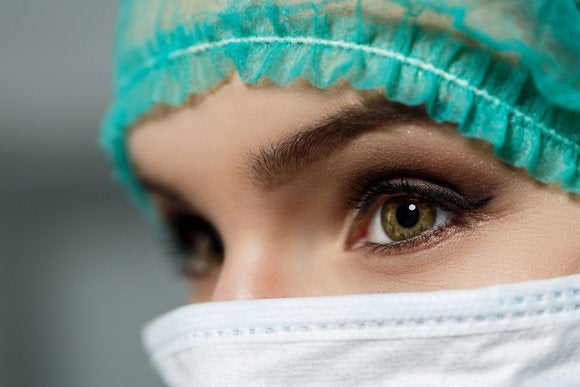
-
Get the Facts on Sports Eye Injuries
Eye doctors in Chicago and across the country often recommend that patients wear protective eyewear while playing sports in order to prevent or lower the risk of serious eye injuries. An eye injury can cause permanent damage to your eye, and may necessitate a visit to an ophthalmologist for emergency eye care or eye surgery. Here is a look at some important facts about sports eye injuries and maintaining eye care while playing sports.
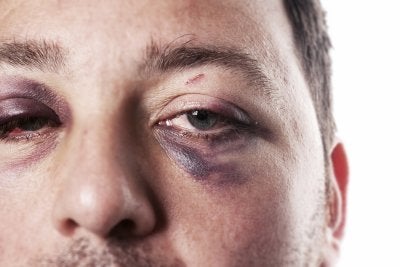
Understanding Common Sports-Related Eye Injuries
The most common causes of sports-related eye injuries are fast moving balls, swinging clubs or bats, and aggressive contact between players. The sports that result in the most eye injuries are high-contact sports such as basketball, baseball, and racquet sports. A sports-related eye injury can be blunt, penetrating, or radiating. Regardless of how minor an injury seems, it’s crucial that you visit an ophthalmologist or eye doctor as soon as possible to evaluate the extent of the injury and receive appropriate eye care.
Preventing Injuries While Playing Sports
Eye doctors, opticians, and ophthalmologists recommend that everyone wear protective eyewear when participating in any type of sporting event. The eyewear that your doctor recommends will depend upon whether the sport is high-risk, moderate-risk, or low-risk. Eyeglasses and sunglasses are not appropriate protective eyewear, and if you wear contact lenses, you’re at a higher risk of a serious eye injury. Your optical center might carry certified safety eyewear that is appropriate for the sport you play. If they don’t, your eye doctor can refer you to a sporting goods store or specialist for protective eyewear.
Recognizing When Emergency Eye Care Is Necessary
Not every eye injury necessitates emergency eye care. If you sustain an eye injury that results in sudden vision loss, severe pain in or around the eye, bulging or swelling of eye tissues, double vision, excessive discharge or tearing, or new or extreme floaters, halos, flashes, or streaks of light, visit an optical center for emergency eye care. Your eye doctor or ophthalmologist will perform diagnostic tests to determine whether you’ll need eye surgery.
-
What Is Astigmatism?
If your eye doctor has diagnosed you with astigmatism, you might need specialized eye care in Chicago . Astigmatism results from a distortion in the shape of your eye’s cornea, causing blurry vision that necessitates vision correction via eyeglasses or contact lenses. Your ophthalmologist might be able to reverse or slow the progression of astigmatism by fitting you with special contact lenses that slowly correct the shape of your eyes.
Watch this video to learn more about astigmatism and how it affects your vision. An experienced ophthalmologist discusses the signs and symptoms of astigmatism, and explains how an eye doctor can treat the condition. An optician or ophthalmologist at your local optical center can offer comprehensive eye care services to treat your astigmatism.
